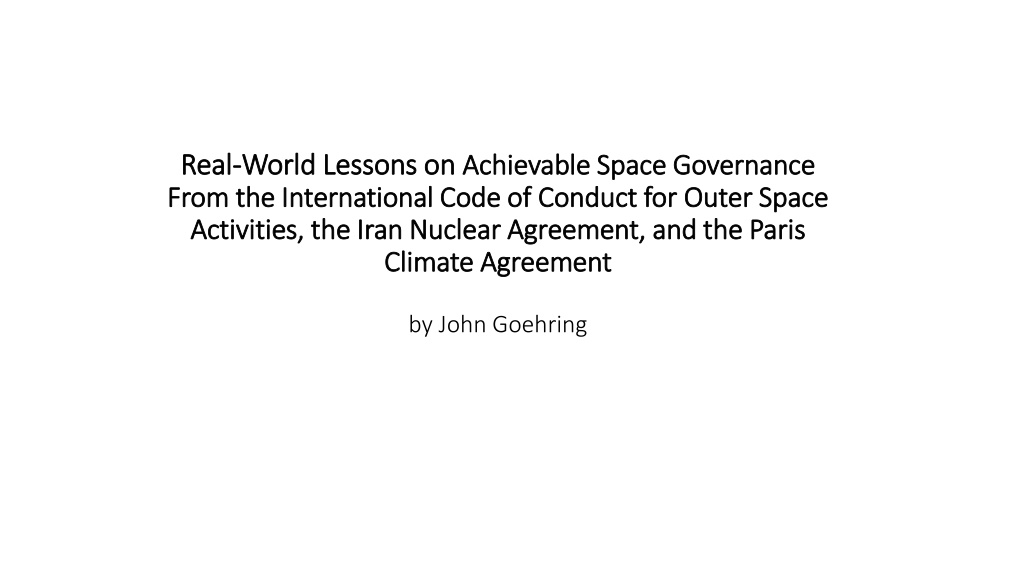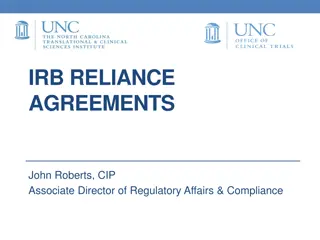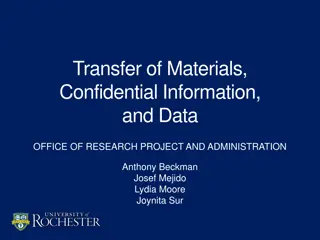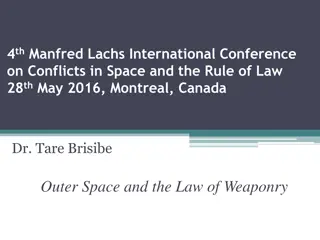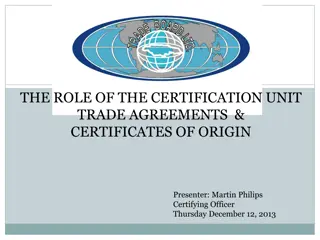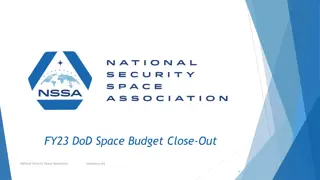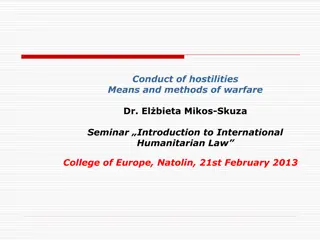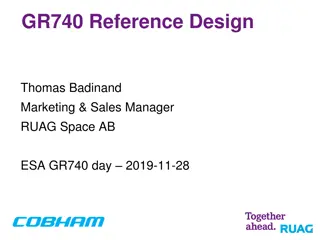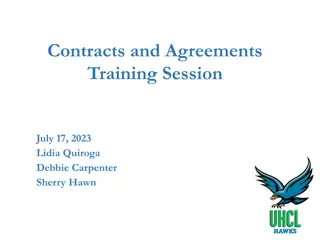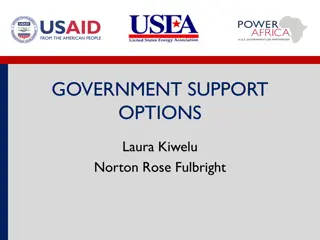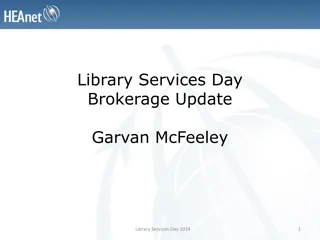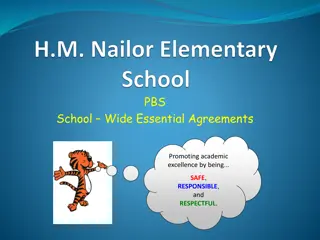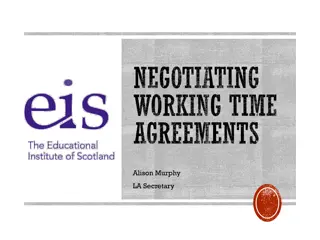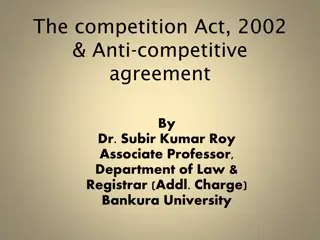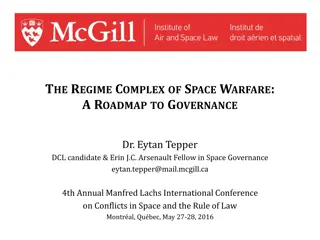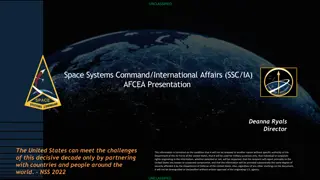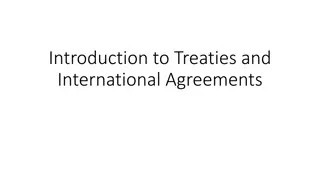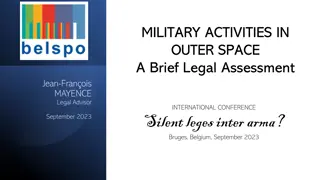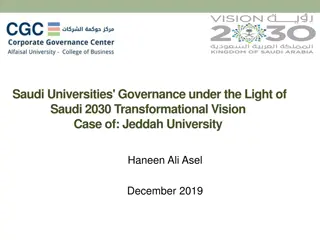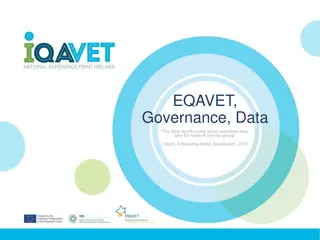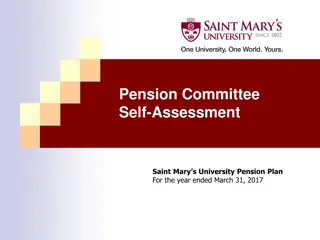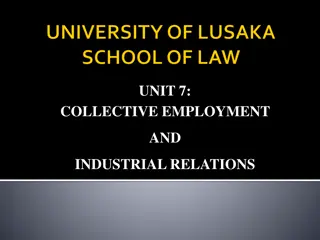Lessons on Achievable Space Governance from International Agreements
Learn about achievable space governance through real-world examples such as the International Code of Conduct for Outer Space, the Iran Nuclear Agreement, and the Paris Climate Agreement. Explore the future of space governance, various forms of international agreements in the U.S., and the role of Congress in these agreements.
Download Presentation

Please find below an Image/Link to download the presentation.
The content on the website is provided AS IS for your information and personal use only. It may not be sold, licensed, or shared on other websites without obtaining consent from the author. Download presentation by click this link. If you encounter any issues during the download, it is possible that the publisher has removed the file from their server.
E N D
Presentation Transcript
Real Real- -World Lessons on World Lessons on Achievable Space Governance Achievable Space Governance From the International Code of Conduct for Outer Space From the International Code of Conduct for Outer Space Activities, the Iran Nuclear Agreement, and the Paris Activities, the Iran Nuclear Agreement, and the Paris Climate Agreement Climate Agreement by John Goehring
The Future of Space Governance The Future of Space Governance Binding Law Non-binding Norms
Forms of International Agreements in the U.S. Forms of International Agreements in the U.S. Article II Treaty Advice and consent of two-thirds of Senate No involvement from House of Representatives Treaty-Executive Agreement Entered into by President under authority of existing Article II treaty Congressional-Executive Agreement Complete alternative to Article II treaties Involve passage by both House and Senate Two kinds: ex post and ex ante
Forms of International Agreements in the U.S. Forms of International Agreements in the U.S. Ex Post Congressional-Executive Agreement Negotiated by President, then submitted to both House and Senate Ex Ante Congressional-Executive Agreement Negotiated by President using authority already delegated by Congress Sole-Executive Agreement Entered into by President alone using inherent constitutional authority
Congressional Involvement Congressional Involvement Role of Congress - Article II treaty - Ex ante congressional- executive agreement - Ex post congressional- executive agreement Role of Congress - Treaty-executive agreement - Sole-executive agreement - Political agreement
International Code of Conduct (ICOC) International Code of Conduct (ICOC) Expressly non-binding political agreement Congressional input through ad hoc legislation 2013 NDAA, Section 913 Continued congressional opposition to arms control without Senate s consent Defeated for reasons other than Congress
Iran Nuclear Agreement Iran Nuclear Agreement Clarified as non-binding political agreement Congressional input through ad hoc legislation Iran Nuclear Review Act of 2015 Continued confusion and outcry over the role of Congress, despite Nuclear Review Act Congress unable to prevent lifting of U.S. sanctions
Paris Climate Agreement Paris Climate Agreement Treaty-Executive Agreement UNFCCC (1992) Commitments within scope of UNFCCC Binding obligation to set emissions goals, not meet emissions goals Continued confusion and outcry over the role of Congress Bypassing Congress achieved (modest) goals
Lessons Learned Lessons Learned 1. Non-Binding Norms are the Future Maybe Ease of Passage Congressional Impediments Congressional Impediments Ease of Passage
Lessons Learned Lessons Learned 2. Find Authorization in Existing Statutes, But Think Small - National Aeronautics and Space Act of 1958, 205? - 51 U.S.C. 50012, Promotion of the United States Global Positioning System standards?
Lessons Learned Lessons Learned 2. Find Authorization in Existing Statutes, But Think Small National Aeronautics and Space Act of 1958, 205: The Administration (NASA), under the foreign policy guidance of the President, may engage in a program of cooperation in work done pursuant to this chapter, and in the peaceful application of the results thereof, pursuant to agreements made by the President with the advice and consent of the Senate.
Lessons Learned Lessons Learned 2. Find Authorization in Existing Statutes, But Think Small National Aeronautics and Space Act of 1958, 205: I regard this section (205) merely as recognizing that international treaties may be made in this field, and not as precluding, in appropriate cases, less formal arrangements for cooperation. To construe this section otherwise would raise substantial constitutional questions. - President Eisenhower
Lessons Learned Lessons Learned 2. Find Authorization in Existing Statutes, But Think Small 51 U.S.C. 50012, Promotion of the United States Global Positioning System standards The President is encouraged to: (1) Enter into international agreements that promote cooperation with foreign governments and international organizations to (A) Establish the Global Positioning System and its augmentation as an acceptable international standard; and (B) Eliminate any foreign barriers to applications of the Global Positioning System worldwide
Lessons Learned Lessons Learned 3. Reconsider Congressional Involvement - Congress gets involved anyway - Stronger negotiation position - Terms of agreement not constrained by prior legislation - Formal congressional role allows for more robust debate on national interest
Conclusion Conclusion - The future of space governance ought not be contemplated in a vacuum Have a plan -
